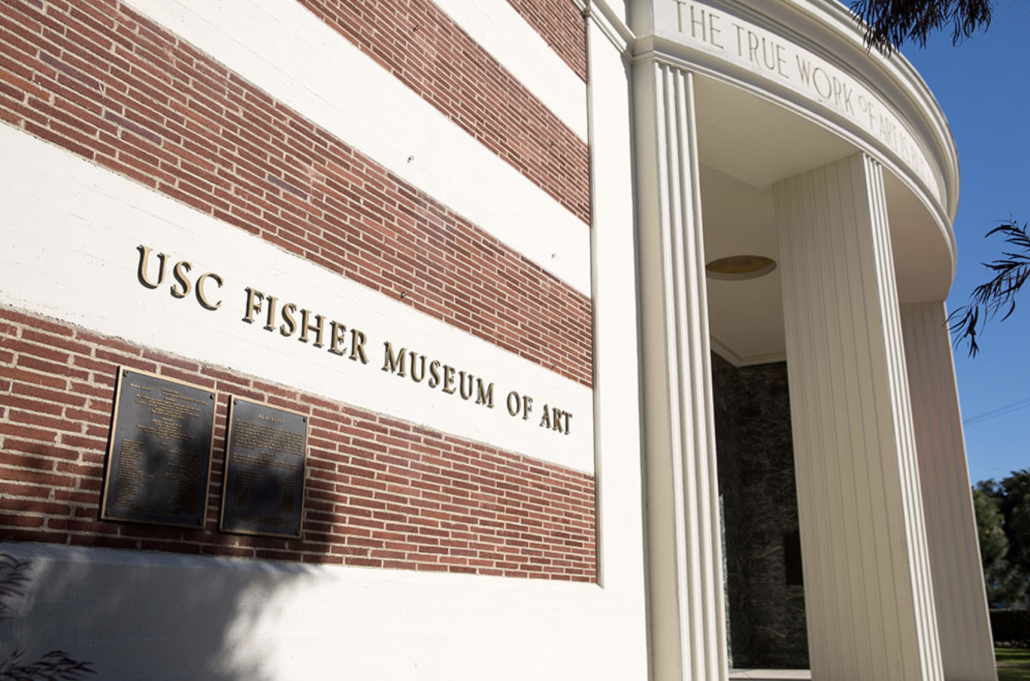Artistically confronting the climate crisis

USC Fisher Art Museum hosted an event addressing climate change. (Gerald Aguilar | Daily Trojan file photo)
This is where the magic happens. On Wednesday evening, a diverse conglomerate of people with a shared interest in climate justice came together at the USC Fisher Art Museum. The event was called “Regenerate: Communities for climate justice — An evening of storytelling and art,” an accurate title which is poetry itself.
Many of the projects presented at the event were led by various students in the Arts and Climate Collective, a collaboration between USC Arts in Action, the USC Office of Sustainability and USC Annenberg Innovation Lab.
The cohort of students was chosen to be a part of the Arts and Climate Collective’s pilot program in Spring 2021. Undergraduates and graduates across seven schools received a $1,000 grant to help propel their personal experiences and visions involving climate justice and sustainability into an intersectional medley of tangible stories. The result was podcasts, documentaries, short films and more, each completely student-run and containing unimaginable talent.
Cameron Audras described his project @the.resiliance.project as a “climate action performance series in eight movements that relates to the United Nations’ 17 Sustainable Development Goals.” Inside the Fisher Art Museum, two of the eight movements in the Resilience Project, “Electricity” and “Transportation,” were presented and incorporated spoken word poetry with interpretive dance, an original soundtrack and visual storytelling.
For his piece, Audras and other collaborators thought about how today’s climate movement does not always present as universal.
“I wanted to see if we can somehow showcase all of the different facets of climate and how, at USC, we’re all studying all these different interdisciplinary but disciplinary subjects,” Audras said.
Another Arts and Climate Collective awardee speaking at the event was Imani Johnson, a junior majoring in business administration, who founded the student-run podcast Eco Alarm. This podcast finds and amplifies the stories of people making positive environmental changes.
Imani reckoned with sticking to her truth in a way that, from a climate warrior’s perspective, is typically associated with the opposition.
“I could use the skills and understand [the industry] from within and still make change in an industry that, ultimately, we sometimes see as the enemy,” Imani said. “I think it’s been really eye-opening to see that there are other business majors who think the same way.”
Imani discovered it was crucial to be in a community of inspiring and supportive people. Especially in a college environment like USC, the incredible brain power and potential within the student body can go untapped without a clear direction of where to apply it. This need was a key motivator for USC research professor Colin Maclay in co-founding the Arts and Climate Collective in Spring 2021.
“In the lead up to Earth Month, we’d been doing all these interviews with cultural producers, with people who use culture for social change,” Maclay said. “And coming out of those conversations with students and faculty and community members and staff, we’ve heard this desire for students to be able to get involved and to be able to do things that serve their community.”
Maclay remembered the experience of Hannah Findling, another co-founder of the Arts and Climate Collective, who despite being passionate about the environment did not know how to be involved.
The Regenerate event raised countless examples of places “to go to do the things,” as Maclay mentioned, and many are not within USC’s privileged gates. For example, a panel discussion inside the Fisher Art Museum brought in leaders of the People not Pozos, which is a grassroots campaign giving back power to local neighborhoods whose health is at severe risk from oil drilling.
By inviting members of the South Central community to the event, invaluable conversations about socio-economic disparities intersecting with climate change were held with the people whose voices are simultaneously the most important and the least commonly heard.
Also on the panel was Nalleli Cobo, who told her story about growing up in University Park across the street from a toxic oil well, forcing her into her role as a climate justice activist at only nine years of age.
“When I was growing up, I had body spasms so severe, I couldn’t move … I had to sleep in a chair to not choke on my own blood at night,” Cobo said. “Asthma is something I’m always gonna have to live with. Headaches, stomach pains, I had it all.”
Cobo is now “considered among the world’s most influential people in climate policy” by the Center for the Study of Political Graphics, and has recently been in remission from a cancer diagnosis. Her story and ability to recount it was enough to inspire action.
Nalleli ended the discussion by reminding the audience that “it’s never too early or too late to join activism.”
Events like these are a reminder that there is always a space to get involved in climate justice. For some, the Arts and Climate Collective is that place. For others, activism can start with just listening to the stories that are being told.
“It’s better to light one match than curse the darkness especially being a part of this collective, I feel like I’m surrounded by so many incredible individuals who all have the same goal as me and all know that we’re in the fight of our lives right now,” said Gwenan Walker, an Arts and Climate Collective grant recipient working on an animation love project. “Just knowing that I’m not alone and there’s thousands of matches out there, it doesn’t scare me anymore.”

